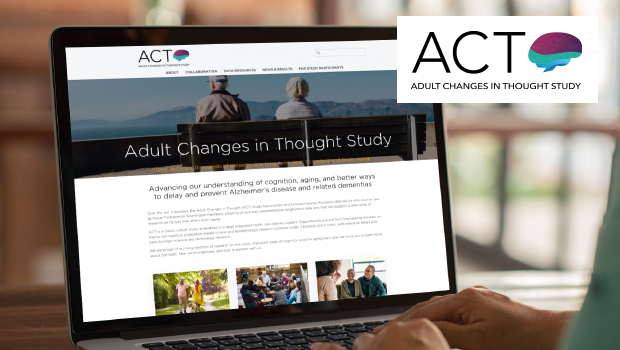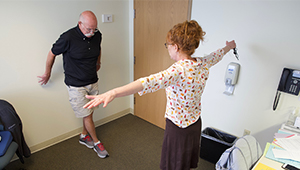Healthy aging: New tool for research and collaboration

The Adult Changes in Thought (ACT) Study takes another leap forward in understanding brain aging and dementia
The Adult Changes in Thought (ACT) Study is one of the world’s longest-running studies of cognition, brain aging, Alzheimer’s disease, and related dementias. With support from the National Institute on Aging (NIA), the ACT Study has been enrolling volunteers ages 65 and older from the Kaiser Permanente Washington population for more than 30 years.
With NIA’s longstanding partnership, Kaiser Permanente Washington Health Research Institute (KPWHRI) and the University of Washington have collaborated for decades to develop vast stores of clinical, medical record, genetic, and pathologic data from the ACT Study. Now, with the launch of the study’s new website — ACTAgingResearch.org — the team has taken another leap forward to advance research on late-life cognition, well-being, and healthy aging.
A resource for scientists, study volunteers, and the public
Since its origin in 1986 as the Alzheimer’s Disease Patient Registry, the ACT Study has been instrumental in improving our understanding of brain health and ways to help prevent Alzheimer’s disease and dementia. Among the study’s many noteworthy contributions are findings showing a reduced risk of Alzheimer’s disease among participants reporting regular exercise. The study also shed light on medication-related risks of certain anticholinergic drugs and has explored whether Alzheimer’s is, in fact, not one condition but a constellation of different subgroup types.
“Our publicly funded ACT research has consistently worked with our member participants for decades,” said Eric B. Larson, MD, MPH, one of the ACT Study’s multiple principal investigators (MPIs) and a senior investigator at KPWHRI. “Our participants and the ACT teams have created a true treasure trove of valuable knowledge and data — a living laboratory of aging.”
In addition to Dr. Larson, the other ACT Study MPIs are Paul Crane, MD, MPH, professor of medicine at the University of Washington and Andrea LaCroix, PhD, professor and chair of epidemiology at the University of California, San Diego.
With a recent 5-year funding award from NIA to grow ACT Study research and develop “a national research resource,” the team has broadened their vision to include serving as a rich, innovative, and enduring resource that contributes pathbreaking scientific knowledge about brain health and healthy aging. That’s how the idea for the new ACT Study website was born.
“A large and talented team has worked hard for many years on the ACT Study, providing an important source of data through our extensive data-sharing efforts, with a substantial contribution to the scientific efforts of investigators locally and around the world,” Crane said. “We are so proud to have reached this stage, where a public-facing website really makes a ton of sense.”
Launched on May 5, ACTAgingResearch.org is designed to increase visibility, showcase the latest research results, and provide instructive information about capabilities and capacity.
For scientists who want to collaborate with ACT Study researchers or use the study’s vast data resources, the website is a rich space to explore and learn more about the cohort, study design, data collection and measurement, and ongoing projects.
For instance, potential collaborators could review the study’s data resources, familiarize themselves with past publications, view the backgrounds of kindred investigators, and explore the Data Query Tool to assess feasibility of a given study idea.
“This new web site will make it even easier for scientists to find us and further our efforts to collaborate with and facilitate the careers and research of talented scientists around the world,” Crane said. “We invite potential collaborators to learn more and connect.”
For people who volunteer to be in the ACT Study, the website provides reference materials, including consent forms and instructional documents, as well as current and past newsletters sharing updates about study findings and other important study information.
“Our participants are motivated to get maximum value from their loyal participation over many years,” Larson said. “They want to advance science by our team and others worldwide.”
Next steps
The website will add up-to-date data documentation and information about ancillary ACT research on eye health and air pollution. The team is also working on new functionality that will integrate data requests into a back-end database to facilitate tracking and communication.
“The new ACT website makes it easier to learn about and from ACT,” Larson said. “It advances our team’s goal to constantly learn from our work, sharing our results and advancing the work of others to learn.”
New funding

Grant of over $55M to boost Alzheimer’s, dementia study
Kaiser Permanente Washington will co-lead an expanded ACT Program to better understand the aging brain.
Research

Cataract surgery linked with lessened dementia risk
JAMA Internal Medicine study finds cataract surgery associated with 30% lower risk of dementia in aging population.
ACT Study

Roundup of 3 recent studies on dementia risk
Researchers explore links between hearing loss, military service, and cognitive decline — and look at timeliness of diagnosis.
Live Healthy

How to lower your risk of dementia
It’s never too late (or too soon) to take preventive steps.


